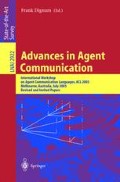Abstract
Protocols for multiagent interaction need to be flexible because of the open and dynamic nature of multiagent systems. Such protocols cannot be modeled adequately via finite state machines (FSMs) as FSM representations lead to rigid protocols. We propose a commitment-based formalism called Nonmonotonic Commitment Machines (NCMs) for representing multiagent interaction protocols. In this approach, we give semantics to states and actions in a protocol in terms of commitments. Protocols represented as NCMs afford the agent flexibility in interactions with other agents. In particular, situations in protocols when nonmonotonic reasoning is required can be efficiently represented in NCMs.
We are grateful to the anonymous referees for their useful comments. We would like to thank Ashok Mallya and Pinar Yolum for the helpful discussions. This work is supported by the National Science Foundation under grant DST-0139037.
Access this chapter
Tax calculation will be finalised at checkout
Purchases are for personal use only
Preview
Unable to display preview. Download preview PDF.
References
Smith, R.G.: The contract net protocol: High-level communication and control in a distributed problem solver. IEEE Transactions on Computers 29, 1104–1113 (1980)
Cox, B., Tygar, J., Sirbu, M.: Netbill security and transaction protocol. In: Proceedings of the First USENIXWorkshop on Electronic Commerce, pp. 77–88 (1995)
Giunchiglia, E., Lee, J., Lifschitz, V., McCain, N., Turner, H.: Nonmonotonic causal theories. Artificial Intelligence (2003) (to appear)
Yolum, P., Singh, M.P.: Commitment machines. In: Meyer, J.-J.C., Tambe, M. (eds.) ATAL 2001. LNCS (LNAI), vol. 2333, pp. 235–247. Springer, Heidelberg (2002)
McCarthy, J.: Elaboration tolerance. In progress (1999), http://www-formal.stanford.edu/jmc/elaboration.html
Lifschitz, V.: Missionaries and cannibals in the causal calculator. In: Proceedings of the 7th International Conference on Principles of Knowledge Representation and Reasoning, pp. 85–96 (2000)
Bratman, M.E.: Shared cooperative activity. The Philosophical Review 101, 327–341 (1992)
Shoham, Y.: Agent-oriented programming. Artificial Intelligence 60, 51–92 (1993)
Grosz, B.J., Kraus, S.: Collaborative plans for complex group action. Artificial Intelligence 86, 269–357 (1996)
Castelfranchi, C.: Commitments: From individual intentions to groups and organizations. In: Proceedings of the AAAI 1993 Workshop on AI and Theories of Groups and Organizations: Conceptual and Empirical Research (1993)
Krogh, C.: Obligations in multiagent systems. In: Åmodt, A., Komorowski, J. (eds.) Scandinavian Artificial Intelligence Conference 1995 (SCAI 1995), Trondheim, pp. 19–30 (1995)
Singh, M.P.: An ontology for commitments in multiagent systems: Toward a unification of normative concepts. Artificial Intelligence and Law 7, 97–113 (1999)
Singh, M.P.: A social semantics for agent communication languages. In: Proceedings of the 1999 IJCAI Workshop on Agent Communication Languages, Springer, Heidelberg (2000)
Harel, D., Kozen, D., Tiuryn, J.: Dynamic Logic. MIT Press, Cambridge (2000)
Kowalski, R., Sergot, M.: Logic-based calculus of events. New Generation Computing 4, 67–95 (1986)
McCarthy, J.: Situations, actions and causal laws. TR, Stanford University (1963)
Girault, C., Valk, R.: Petri Nets for System Engineering (2003)
Harel, D.: Statecharts: A visual formalism for complex systems. Science of Computer Programming 8, 231–274 (1987)
Jennings, N.R.: Commitments and conventions: The foundation of coordination in multiagent systems. Knowledge Engineering Review 2, 223–250 (1993)
Sandholm, T., Lesser, V.: Issues in automated negotiation and electronic commerce: Extending the contract net framework. In: [?], pp. 66–73 (1998) (Reprinted from Proceedings of the International Conference on Multiagent Systems, 1995)
Yolum, P., Singh, M.P.: Flexible protocol specification and execution: Applying event calculus planning using commitments. In: Proceedings of the 1st International Joint Conference on Autonomous Agents and Multi Agent Systems (AAMAS), pp. 527–534. ACM Press, New York (2002)
Koning, J.L., Huget, M.P.: A semi-formal specification language dedicated to interaction protocols. In: Kangassalo, H., Jaakkola, H., Kawaguchi, E. (eds.) Information Modeling and Knowledge Bases XII, Frontiers in Artificial Intelligence and Applications, IOS Press, Amsterdam (2001)
Singh, M.P.: Agent communication languages: Rethinking the principles. IEEE Computer 31, 40–47 (1998)
Sadek, D.: Compliance in Arcol, Personal communication (1997)
Finin, T., Fritzson, R., McKay, D., McEntire, R.: KQML as an agent communication language. In: Proceedings of the International Conference on Information and Knowledge Management, pp. 456–463. ACM Press, New York (1994)
Dignum, F., van Linder, B.: Modelling social agents: Towards deliberate communication. In: Handbook of Defeasible Reasoning and Uncertainty Management Systems, pp. 357–380. Kluwer, Dordrecht (2002)
Guerin, F., Pitt, J.: Denotational semantics for agent communication languages. In: Proceedings of the Fifth International Conference on Autonomous Agents, pp. 497–504. ACM Press, New York (2001)
Holzmann, G.J.: Design and Validation of Computer Protocols. Prentice-Hall, London (1991)
W3C: Business process execution language for web services, version 1.1 (2003), http://www-106.ibm.com/developerworks/webservices/library/ws-bpel/
Author information
Authors and Affiliations
Editor information
Editors and Affiliations
Rights and permissions
Copyright information
© 2004 Springer-Verlag Berlin Heidelberg
About this paper
Cite this paper
Chopra, A., Singh, M.P. (2004). Nonmonotonic Commitment Machines. In: Dignum, F. (eds) Advances in Agent Communication. ACL 2003. Lecture Notes in Computer Science(), vol 2922. Springer, Berlin, Heidelberg. https://doi.org/10.1007/978-3-540-24608-4_11
Download citation
DOI: https://doi.org/10.1007/978-3-540-24608-4_11
Publisher Name: Springer, Berlin, Heidelberg
Print ISBN: 978-3-540-20769-6
Online ISBN: 978-3-540-24608-4
eBook Packages: Springer Book Archive

